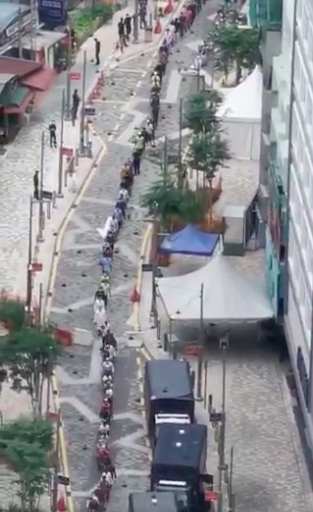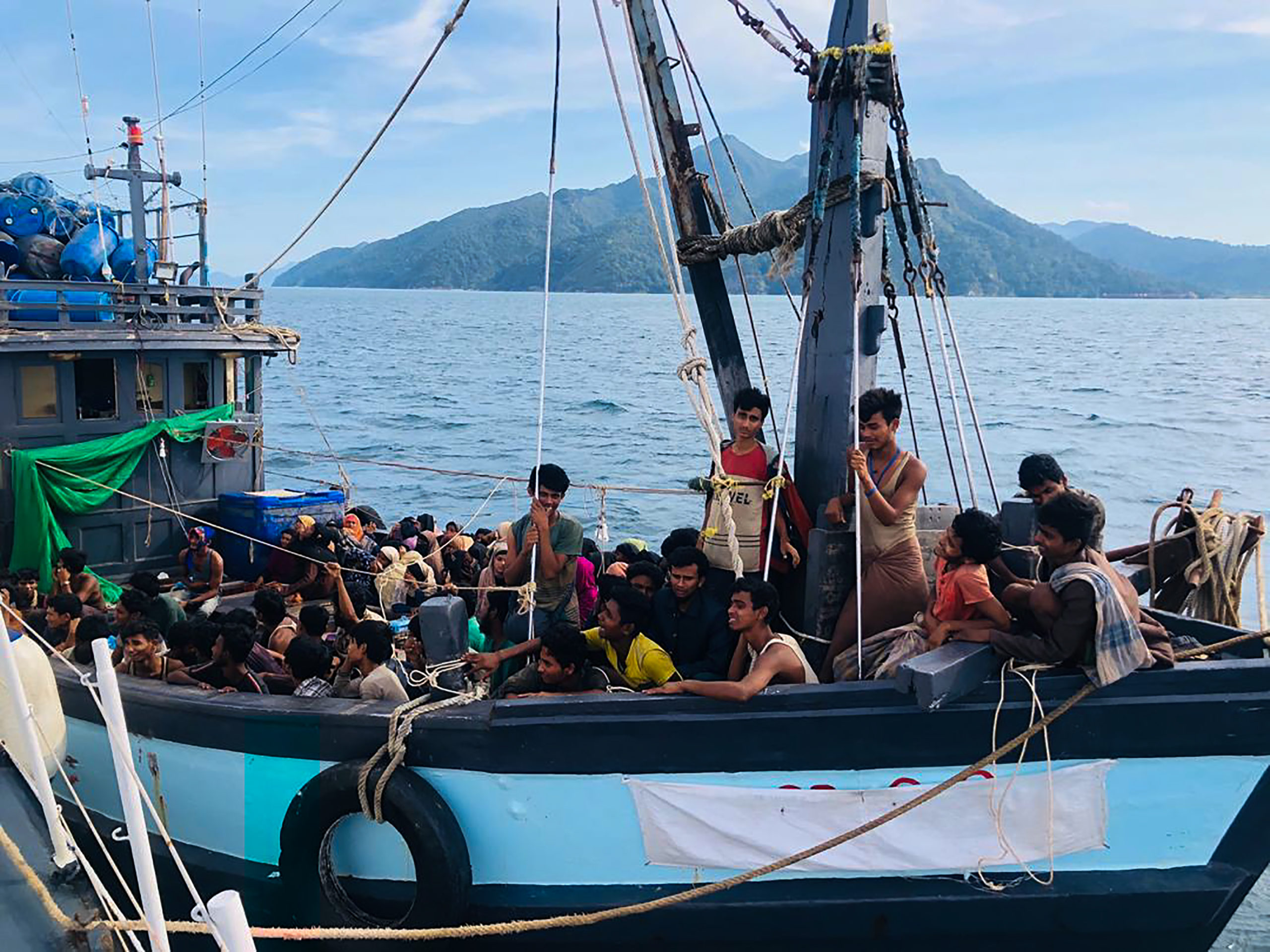Even though it’s not a signatory to the UN’s 1951 Refugee Convention, Malaysia has for years provided a safe haven for Rohingya people displaced from their homes in Myanmar.
But as the novel coronavirus drives lockdowns and strict closures in Malaysia and across Southeast Asia, online anger toward the refugees has boiled over in recent months, especially as boats ferrying hundreds more Rohingya people have made their way to the peninsula’s shores during the height of the Covid-19 pandemic.
Now, as Malaysian immigration officials have stepped up a series of mass arrests of migrants, activists and groups who represent the Rohingya communities say they’ve been targeted for online harassment, including vulgar insults and threats of violence, that has put fear in those who would otherwise speak out.
Sharifah Shakirah moved to the US within the past year, but for much of her life she has been a prominent Rohingya activist in Malaysia.
“Hearing about the xenophobia, these comments on social media, it’s been very shocking,” Shakirah said, describing the Malaysia she grew up in as a welcoming place. “I did not expect that, for the Rohingya community to be attacked like that.”
Last month, tensions flared in the country when a boat believed to be carrying about 500 refugees from the crowded Rohingya refugee camps of Bangladesh was turned away from landing in Malaysia. When the ship finally returned to Bangladesh, that country’s coast guard recovered the passengers. It was estimated at least 24 had died in the months-long voyage through the Andaman Sea.
As the founder of the Rohingya Women Development Network, a social advocacy group that has worked to help women recover from the harsh experiences of human trafficking, Shakirah said her main focus has been fostering a sense of empowerment within the community. However, as rumours of deportation spread in Malaysia, Shakirah said people in her network in the country are keeping their heads down.
“Everybody who speaks for Rohingya gets attacked,” she said. “They even use our pictures to give wrong information, saying we’re asking for equal citizenship in Malaysia and stuff like that, which is not true.”
Like other countries in Southeast Asia, Malaysia saw an influx in the Rohingya population after the August 2017 escalation of conflict in the Rakhine state of Myanmar. The Burmese military, already entrenched in warfare with the armed forces of the Arakan ethnicity in the state, launched a series of so-called “clearance operations”, condemned by the UN as acts of genocide against the Rohingya Muslim minority, that sent thousands fleeing into Bangladesh.
While Muslim-majority Malaysia initially welcomed the Rohingya, state officials have since hardened in their rhetoric and have in recent times dismissed the displaced people as illegal immigrants.
The shifting state response intertwined with mounting tensions of the Covid-19 era has spilled over in a harsher front on social media, where digital unrest has included a bombardment of comments, memes and hashtags denouncing the Rohingya presence in the country. Some users claim that the Rohingya are violating measures to prevent the spread of the virus; others say the Muslim minority group from wartorn Rakhine state are ungrateful for the temporary shelter in Malaysia and are pushing for a permanent home there – a point Rohingya groups have vehemently denied.
Meanwhile, digital petitioners on the popular Change.org signed on to at least five different initiatives urging the government to deport the Rohingya back to Myanmar or Bangladesh, where roughly 800,000 people live in crowded refugee camps around Cox’s Bazar. Hundreds of thousands of signatures were added to the petitions before website moderators deleted them for violating their rules against hate speech.
On 6 May, Malaysian social organisation Projek Wawasan Rakyat pulled together regional aid and refugee rights workers for a Rohingya-themed webinar.
Lilianne Fan, international director of humanitarian group Geutanyoe Foundation, said at the webinar that she’d never heard of a Rohingya push for citizenship in Malaysia.
“They’re asking for citizenship in Myanmar,” she stressed. “Not a single Rohingya I’ve met, and I’d say I’ve met tens of thousands, asks for citizenship here. They would like to return to Myanmar, they’d like to go back.”
Even still, claims to the contrary have found traction in Malaysia, where some of the arrest-and-deport rhetoric of the online campaign is now being carried out by police.
Immigration authorities say they arrested 586 undocumented migrants in a 1 May raid in the Malaysian capital Kuala Lumpur. A short video shared that day on social media by the Bangkok-based Asia Pacific Refugee Rights Network (APRRN) depicted a long line of people reported to be migrants, many of whom are Rohingya, marching single-file into detention under the watchful eyes of armed police.

rounded up to go into detention. Photo: APPRN
Then, earlier this week, Malaysian media reported that police had raided an area around the Selayang Wholesale Market, a normally bustling commercial centre frequented by migrants. An estimated 15,000 Rohingya people in the neighbourhoods surrounding the market have been includaed in lockdowns by the state under strict measures known as an Enhanced Movement Control Order due to the prevalence of Covid-19 infections there.
A third round of mass arrests was then reported by Reuters on 12 May, with 1,368 undocumented migrants – many of whom were asylum seekers from Myanmar and Bangladesh – rounded up by Malaysian immigration authorities. Among them were 261 women and 98 children.
In late April, Minister of Home Affairs Datuk Seri Hamzah Zainudin, who oversees immigration offices, told Malaysian newspaper The Star that even Rohingya nationals recognised as refugees by the UN High Commissioner for Refugees “have no status, rights or basis to make any claims on the government.”
As undocumented immigrants, most of the Rohingya were initially excluded from food aid programmes extended to Malaysian citizens during the pandemic. They later received state rations and were granted access to a handful of local stores.
Any organisation that claims to represent the Rohingya ethnic group is illegal under the [Registrar of Societies] Act, and legal action can be taken
Minister of Home Affairs Datuk Seri Hamzah Zainudin
The Malaysian Ministry of Home Affairs recorded this spring more than 179,500 officially recognised UNHCR cardholders in Malaysia, almost 101,600 of whom are Rohingya.
However, Zainudin said the state did not officially recognise any civil society organisations in Malaysia associated with the Rohingya minority.
“Any organisation that claims to represent the Rohingya ethnic group is illegal under the [Registrar of Societies] Act, and legal action can be taken,” he said.
A representative of advocacy group Fortify Rights said he’d not yet heard of prosecutions of Rohingya groups under the registry act but believed it had already chilled Rohingya civil society groups.
The online rhetoric and real-world arrests led a group of 84 human rights groups to send an open letter on May 11 to Malaysian Prime Minister Muhyiddin Yassin urging him to protect the Rohingya refugees living under his authority. The letter, sent by Fortify Rights and signed by a mix of international and Malaysian organisations, said the digital campaign against the Rohingya began shortly after the refugee boat was turned away in April.
From then, the letter reads, the Malaysian government has sent “mixed messages” regarding the public attitude toward the Rohingya, swinging between calls for sympathy and official statements supporting measures to “stop the intrusion of illegal immigrants”.
Fortify Rights cited in a related release a UNHCR urging to nations to “ensure that the public discourse and response to COVID-19 does not contribute to xenophobia and racial discrimination”.
That same point was carried by Marina Mahathir, a social activist and daughter of former Malaysian prime minister Mahathir Mohamed. The younger Mahathir also attended the Projek Wawasan Rakyat webinar and drew from her past experience as a leader of the Malaysian AIDS Foundation to caution against creating “gaps” of prejudice in the country’s response to the novel coronavirus.
“When you dehumanise people, it’s easier to take away their rights,” she said. “Therefore, that’s where the gap in managing the pandemic happens, when you deny the groups of people their rights as human beings by denying their health.”


